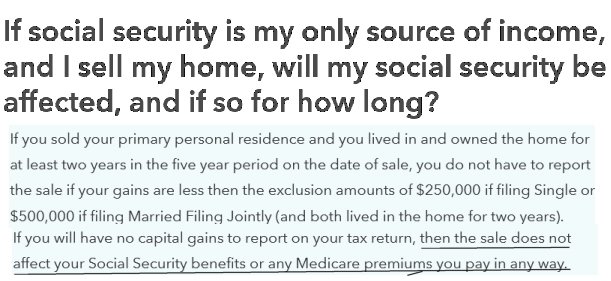Sawfish
Member
- Location
- The bottom of the sea.
I've been on Medicare for about 10 years now, never really understood it before I was enrolled, and in truth, I only understand the parts that affect our particular situation.
Medicare premiums are based on a figure on your 1040 forms called adjusted gross income (AGI):
https://www.irs.gov/e-file-providers/definition-of-adjusted-gross-income
Making a long story short(er), if you file jointly, as we do, so long as your AGI is less than 194K (for 2023), you'll pay the lowest Part B premium, which will be $164.90 (call it 165) for each of the two spouses over 65.
Here's an important part: at the end of any given year they look back at your Fed returns for *two* years prior, to get the AGI to be used for the billing amount. For 2023's premium, they looked back to your AGI for 2021.
In 2017 I really stepped into it by taking a cap gain for that year, and this raised our AGI that year to ~$400K. Two years later, at the beginning of 2019, Medicare sent the expected rate announcement, and instead of it being in the $140 as it was then (2019), it went up to >$400 per mo. Fortunately, my wife was not yet 65 and so all I had to pay for that year was the $400+ per mo, but it surprised and shocked me.
And the following year, 2020 Medicare was supposed to look back twp years, to 2018, which had no big cap gain and the AGI would put us back into the minimum premium category, I was again informed that it would be $400+ per mo.
I had to work long and hard to get Medicare to recognize this and correct it; I wrote many letters, made many phone calls, and went to the local SS office for a personal meeting. Literally, I paid the higher premium ($400+) for all of 2020 before they agreed to correct the premium. They did, in fact, credit me with overpayment for 2020, so in 2021 I did not have to pay any premiums for a few months, then pay the minimum premium for the remainder of the year.
If you try to control expenses, this can come as a very unpleasant surprise.
Medicare premiums are based on a figure on your 1040 forms called adjusted gross income (AGI):
https://www.irs.gov/e-file-providers/definition-of-adjusted-gross-income
Making a long story short(er), if you file jointly, as we do, so long as your AGI is less than 194K (for 2023), you'll pay the lowest Part B premium, which will be $164.90 (call it 165) for each of the two spouses over 65.
Here's an important part: at the end of any given year they look back at your Fed returns for *two* years prior, to get the AGI to be used for the billing amount. For 2023's premium, they looked back to your AGI for 2021.
In 2017 I really stepped into it by taking a cap gain for that year, and this raised our AGI that year to ~$400K. Two years later, at the beginning of 2019, Medicare sent the expected rate announcement, and instead of it being in the $140 as it was then (2019), it went up to >$400 per mo. Fortunately, my wife was not yet 65 and so all I had to pay for that year was the $400+ per mo, but it surprised and shocked me.
And the following year, 2020 Medicare was supposed to look back twp years, to 2018, which had no big cap gain and the AGI would put us back into the minimum premium category, I was again informed that it would be $400+ per mo.
I had to work long and hard to get Medicare to recognize this and correct it; I wrote many letters, made many phone calls, and went to the local SS office for a personal meeting. Literally, I paid the higher premium ($400+) for all of 2020 before they agreed to correct the premium. They did, in fact, credit me with overpayment for 2020, so in 2021 I did not have to pay any premiums for a few months, then pay the minimum premium for the remainder of the year.
If you try to control expenses, this can come as a very unpleasant surprise.
Last edited:


